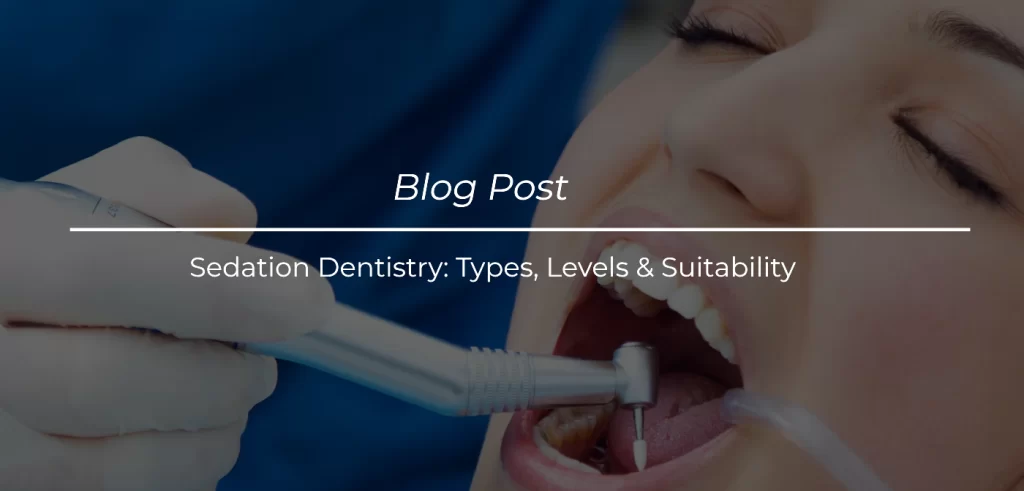Sedation Dentistry: Types, Levels & Suitability
To keep your teeth and gums healthy, practise good dental hygiene and have regular exams. If you’re one of the many Australians who avoid going to the dentist out of fear or anxiety, sedation dentistry may be your answer. This technique will make your regular dental appointments stress-free and pleasant.
You can be one of those individuals who have dental anxiety or phobia if you make excuses to avoid coming to visits. For example, due to their discomfort in the dentist’s chair, people with dental anxiety frequently avoid going to the dentist.
If this sounds familiar to you, don’t worry, you are not alone; millions of others experience similar issues. However, you might experience a greater sense of relaxation and ease during the dental sedation process. First, let’s discuss what sedation dentistry is, its types, levels, and suitability so that you can have complete information on sedation dentistry. Read more on our blog How IV Sedation Dentistry Can Improve Your Next Dentist Visit
What Do You Mean By Sedation In Dentistry
Sedation dentistry uses a variety of drugs to help patients relax while getting dental work done. Sedation dentistry was formerly known as sleep dentistry. Except for those who receive general anaesthesia in severe cases, most patients who undergo sedation dentistry remain awake throughout the procedure.
What Are The Types Of Sedation Used In Dentistry
There are four primary categories of sedation practises, depending on the patient’s level of fear and anxiety. It entails general anaesthesia, intravenous sedation, oral sedation, and nitrous oxide sedation. Additionally, sedatives now make it possible for people who might otherwise avoid the dentist to receive crucial dental care.
- Oral Sedation
A patient is put to sleep before receiving dental therapy by swallowing an oral sedative. The patient often takes this drug an hour before the procedure. Even though this kind of sedative relaxes you, you stay awake. Depending on the dosage, varying degrees of sleepiness result. - Intravenous Sedation
Dentists employ intravenous sedation to ensure a steady medication supply during dental surgery. However, it makes patients sleepy and unable to pay attention to what is happening. Therefore, you will need to wear a nasal oxygen tube if the dentist decides to sedate you using this method, and the dentist will keep an eye on your vital signs while you’re asleep. - Nitric Oxide
Patients who use nitrous oxide as an inhaled sedative to relax breathe oxygen and nitrous oxide into their lungs. Nitrous oxide is administered to the patient via a nasal mask throughout the treatment. Dentists can adjust the dosage as needed. Compared to other forms of sedation, inhaled sedation wears off more quickly. After surgery, it usually allows patients to drive themselves home. - General Anaesthesia
- A patient receives general anaesthesia from a licenced dentist. During the dental process, the patient nods off and sleeps for a while. Since dentists will keep an eye on your vital signs throughout the procedure to ensure your safety, you won’t remember anything when you wake up.
What Are The Different Levels Of Sedation Used In Dentistry
In dental operations, there are three primary levels of sedation, including:
- Minimal sedation – Despite being awake, the medicine gives you a feeling of peace and relaxation. Patients benefit from continuing to comply with vocal commands.
- Moderate sedation – You are awake but may feel tired or dreamy at this level of sedation. You won’t recall what happens during the procedure or how you think if you’re under moderate sedation. Most of the time, you can still follow spoken instructions, but the dentist might need to arouse you.
- Deep sedation – In this type of dental sedation, you are nearly unconscious, but your dentist has the power to bring you back to consciousness if required.
- General anaesthesia – Unconscious slumber is another term for general anaesthesia. It is used to render you unconscious throughout a dental procedure.
Who Can Benefit From Sedation?
You might inquire with your dentist about getting dental sedation during your next appointment. But first, ask your dentist if you feel any of the following applies to you:
- Before a dental appointment, your nervousness and unease worsen.
- It’s difficult for you to control your movements.
- You have brittle teeth.
- It’s difficult for you to control your movements.
- You’ve already been through a terrible thing.
- You worry about needles.
- You experience complicated dental problems.
- You have trouble becoming numb.
- Those who require specialised treatment
Book An Appointment
Do not fear the pain of dental treatments anymore because Gisborne Dental has a perfect solution for you. Our expert sedation dentist can meet your relaxation needs in the dentist’s chair. We ensure to make you feel comfortable and peaceful so that you can receive the required dental treatment without any fear or pain.
Call us on (03) 4050 9030 or drop an email at info@gisbornedental.com.au for a caring dental experience. Additionally, you can let us know about your needs by completing our online form.
Frequently Asked Questions
What to seek in a dentist that specialises in sedation?
When performing sedation dentistry procedures, sedation is often utilised sparingly to moderately in dental clinics. However, not all dental practises might have the necessary education or working knowledge in this area. Therefore, you should take into account the following when looking for a dentist facility that offers sedation:
- Qualifications – You can verify the dentist’s credentials to see whether they have any sedation administration experience or training. You might also inquire with them regarding the outcomes of earlier sedative cases.
- Experience – A licenced dentist needs to have a lot of experience working with patients who require sedation dentistry, such as youngsters and adults with special needs.
- Specialisation – To dispense specific sedative doses, any general practice may apply for a licence. However, sedation dentistry experts will be better equipped to quickly and painlessly treat any problem. In addition, it must be administered more frequently to patients with unique issues or constraints, such as those with special needs.
Can I ask the dentist to put me to sleep while they work on my teeth?
You can get sedation if your dentist decides it’s necessary. Any discomfort caused by the approach, whether physical or physiological, will lessen. Your dentist will give the sedative either before or during the process. The degree of your anxiety, the circumstances of your care, and the kind of sedation employed all impact you.
What will happens if my dental insurance does not provide coverage for sedation dentistry?
Even the most generous dental insurance policies frequently only partially cover sedation dentistry. Your insurance plan might pay for the price of the dental work and procedures themselves, for instance, but it is often more challenging to get the sedation fees covered. Additionally, most, if not all, insurance companies do not cover sedation since they view it as an elective procedure.
Specific health insurance policies, however, might pay for it if sedation is required due to a pre-existing condition, such as individuals with special requirements. As a result, you can ask your provider for precise information. Read more about What Can You Expect From Sedation Dentistry?

























